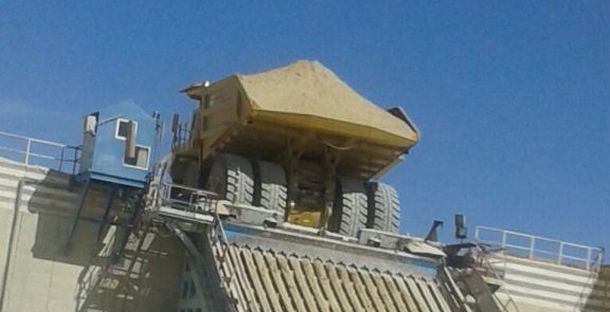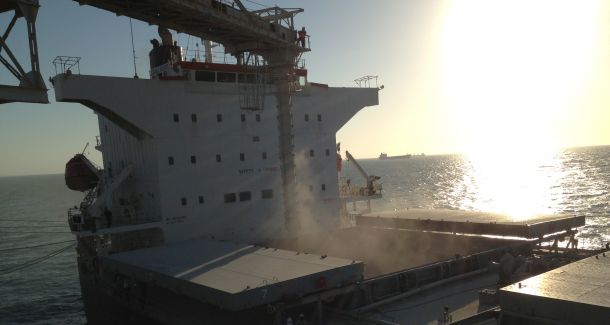
For the first time in three years, a vessel loaded with blood phosphate is heading from Western Sahara to the USA.
UPDATE, 04.08.2021: The ship went to Innophos in Mexico, not to the US.
UPDATE, 4 August 2021: The ship went to Innophos in Mexico, not to the US.
On 17 July 2021, the bulk carrier Amis Ace departed Western Sahara with a cargo of phosphate rock, destination: USA.
The vessel has passed the Canary Islands and is currently steaming towards the state of Virginia on the US east coast.
The vessel has informed that it is heading to Mobjack Bay, Virginia, where it is scheduled to arrive on 2 August. Western Sahara Resource Watch (WSRW) does not expect this port to be the actual, final destination of the cargo. Mobjack Bay is a marina for yachts, and does not receive large cargo vessels. The cargo will most likely be destined for a larger industrial port nearby.
WSRW has not yet identified the importer of the cargo.
It is the first export of phosphate rock from Western Sahara to the US since August 2018. Two large players on the US fertilizer market have both stopped importing from the illegally occupied territory over human rights concerns, in combination with extensive pressure from their owners:
- In 2010, the US firm Mosaic announced it had stopped the imports from the territory, after having been a customer of the Bou Craa mine for several years, “because of widespread international concerns regarding the rights of the Sahrawi people in that region."
- In 2018, the Canadian company Nutrien stopped its imports into the US. Its largest client, New York stock registered Innophos Holdings, announced in 2018 to stop purchasing products from Nutrien's plant in Baton Rouge, Louisiana “as part of Innophos’ commitment to overall social responsibility and good corporate stewardship”.
Since the North American imports stopped in December 2018, Morocco's exports of phosphate rock from the occupied territory dropped to half the volume of recent decades, WSRW's research shows.
Why is the phosphate plunder wrong? Read that here.
Amis Ace (IMO number 9552989) has a 60,830 deadweight tonnage and flies the Panama flag. It is in the same fleet as the gas carrier Joseph Wisdom, which in July 2021 transported gas from the USA to Western Sahara, in itself a new development in 2021.
The large shipment comes at a politically interesting time in a US-Moroccan phosphate tug-of-war.
On 11 March 2021, at the request from the above-mentioned Mosaic, the United States International Trade Commission (USITC) determined that the US industry is “materially injured by reason of imports of phosphate fertilizers from Morocco and Russia" as such products are “are subsidized by the governments of those countries.”
The decision applies to products of the so-called HS codes 3103 and 3105, which are both processed fertilizer products, not phosphate rock itself, which is the unprocessed raw material exported from El Aaiún. The USITC made a report on the matter, dated March 2021.
The US government warned that it would issue a duty on phosphate fertilizers from Morocco and Russia, whereas OCP filed an appeal in response to the decision.
Phosphate rock imports from Western Sahara (or from any other country) have never been subjected to import tariffs in the US.
Processed products are exported from ports in Morocco, such as Jorf Lasfar, a port which the Amis Ace visited shortly before picking up cargo in El Aaiún.
During its stay at the pier of the Bou Craa phosphate terminal - from 16 July at 08:27 to 17 July at 19:19, the Amis Ace's draught deepened from 6,2 to 11,8 meters - suggesting it was almost fully loaded in the operation. The vessel's maximum draught (the distance from the sea to the bottom of the ship) is 12,8 meters.
Just prior to its stay in Saharawi waters, the vessel lay anchored in Las Palmas port, from 9 July at 16:13 to 10 July at 02:04, probably for bunkering or taking other supplies.
The history of US imports of Western Sahara conflict phosphates.
- 1980s. The Geismar, Louisiana, based company Arcadian Corp starts importing phosphate rock. The plant transforms phosphate rock from occupied Western Sahara into phosphoric acid.
- 1996. Arcadian is acquired by the Canadian company PotashCorp.
- 2001-2010. US fertilizer company Mosaic imports 15 shipments to its factory in Tampa, Florida. In 2010, Mosaic announces that it has decided to stop further imports.
- Early 2000s. The Louisiana trade is uncovered, and international investors start raising the matter with PotashCorp. The importer is blacklisted for unethical behavior by numerous investors, particularly in Europe. PotashCorp responds by issuing controversial statements defending the trade.
- 2013. PotashCorp’s Canadian competitor, Agrium, announces a trade agreement with OCP. From then on, Agrium imports heavily into Vancouver, Canada. Agrium quickly receives criticism from the investor community.
- 2017. A Vancouver-bound vessel for Agrium was detained in the Panama Canal for carrying phosphate rock from Western Sahara.
- From 2013 to 2018, Agrium and PotashCorp account for 50% of all global purchases of Western Sahara phosphate rock.
- 2 January 2018. Agrium and PotashCorp merge into a larger company, Nutrien.
- 25 January 2018. The new Nutrien management announces that it will no longer import to Vancouver, to the plant that used to be controlled by Agrium. The management states that it will announce its intentions with the ‘PotashCorp’ imports to Geismar, Louisiana, "certainly by the middle of the year".
- 15 June 2018. Nutrien states to Business and Human Rights Resource Center that "A decision on the need to import rock for this facility is expected after a review of our end product customer needs which is expected to be complete before the fall this year".
- 2 July 2018. Innophos Holding, the company in Louisiana that purchases the end-product from Nutrien’s ‘PotashCorp’ plant in Geismar, announces that it will no longer buy that product, citing reasons of responsibility.
- 1 August 2018. PotashCorp announces it will close its factory in Geismar. This marks the end of ‘PotashCorp’s’, and thus Nutrien’s, involvement. It entails that the exports from Western Sahara to the Americas came to a complete halt.
- 17 July 2021. The bulk carrier Amis Ace departs occupied Western Sahara direction Virginia. Importer unknown. The shipment is the first to the US since August 2018.
New report: Western Sahara phosphate trade halved
The export of phosphate rock from occupied Western Sahara has never been lower than in 2019. This is revealed in the new WSRW report P for Plunder, published today.
New report on Western Sahara phosphate industry out now
Morocco shipped 1.93 million tonnes of phosphate out of occupied Western Sahara in 2018, worth an estimated $164 million, new report shows. Here is all you need to know about the volume, values, vessels and clients.
Caterpillar trucks carry conflict minerals
Trucks of the US company Caterpillar transport phosphate rock in occupied Western Sahara.
US imports of Western Sahara conflict rock to end
A landmark decision has been made. The large-scale exports of conflict phosphates from occupied Western Sahara to the United States will stop this year.



